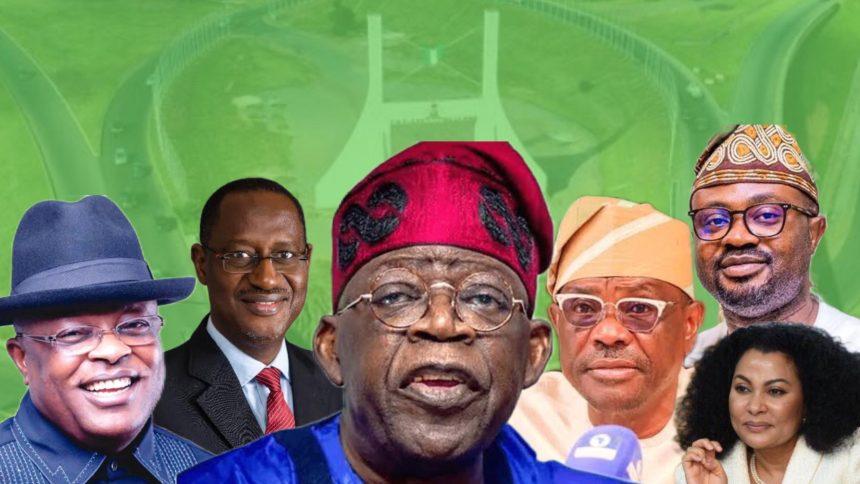The festivities commemorating President Bola Tinubu’s first year in office may have faded, but the scrutiny continues, particularly focused on the performance of his ministers; the bedrock of any government machinery.
Amidst the challenges of governance, where expectations run high, certain ministers have risen above the fray, demonstrating exceptional leadership, resilience, and dedication to their portfolios.
1. Ahmed Dangiwa
Architect Ahmed Dangiwa, a highly accomplished administrator with a wealth of experience spanning over 30 years in administration, real estate, mortgage financing, and housing development has transformed the housing sector since his appointment.
Dangiwa has led the Federal Ministry of Housing and Urban Development to develop and commence implementation of a Strategic Housing Reform plan in line with the Renewed Hope Agenda of Mr. President.

The Minister for Housing and Urban Development, Arc. Ahmed Dangiwa, inaugurated four reform teams as part of efforts to accelerate planned reforms in the housing sector.
A notable component of the plans to revamp the housing sector, is the Renewed Hope New City Development Plan which aims to redefine cities in Nigeria, reduce congestion, and provide quality housing. President Tinubu inaugurated the Renewed Hope Cities and Estates Programme in February 2024, starting with a 3,112-unit project in Abuja. This initiative is part of a larger plan to build 20,000 units in Abuja and 100,000 nationwide. It operates under a Public Private Partnership, easing the financial burden on the government and ensuring quality shelter for citizens.
Under Dangiwa’s leadership, the Federal Ministry of Housing and Urban Development is committed to ensuring Nigerians receive value for government investments in housing projects. This involves completing abandoned government housing projects and simplifying the process for Nigerians to own them. For instance, steps have been taken to expedite the sale and occupancy of 2,870 completed housing units built between 2017 and 2022 under the National Housing Programme (NHP).
READ ALSO: FCT Residents Appeal to Wike Over Developer Harassment and Land Grabbing
The Minister’s notable skill in engaging with stakeholders has been underscored by a report from the Housing Development Advocacy Network (HDAN). He has translated his promises into tangible initiatives, including the revitalization of slum areas, nationwide housing estate construction, launching a mortgage program for overseas Nigerians, and modernizing housing and land access laws. Moreover, he’s improved the effectiveness of agencies like the Federal Mortgage Bank and Federal Housing Authority.
2. Nyesom Wike
Under the leadership of the Minister of the Federal Capital Territory, Nyesom Wike, Abuja is witnessing transformative changes reminiscent of the high standards set by former Minister, Nasir El-Rufai. Wike, who assumed office with a clear commitment to President Tinubu’s mandate, has prioritized improving the city’s transport network. Under his leadership, president Bola Tinubu has commissioned various roads including several abandoned projects in the nation’s capital.
In promoting transparency in the real estate sector, Wike has issued warnings against land racketeering, emphasizing that landowners with Certificates of Occupancy must develop their plots or risk losing them to the government.
READ ALSO: Wike Urges Speedy Resumption of Abuja Master Plan Review with JICA
3. David Umahi
At the forefront of this list stands the Minister of Works, David Umahi, an engineer by profession. True to his portfolio’s name, Umahi has exemplified the essence of his role through a series of notable actions and initiatives.
Umahi’s robust record in infrastructural development as the former governor of Ebonyi State propelled his appointment to oversee the Ministry of Works. As one of the most proactive ministers, he has diligently inspected and assessed roads across Nigeria’s vast expanse of 923,768 km². His comprehensive evaluations led to the identification of federal roads in dire need of rehabilitation, resulting in the allocation of ₦108.5 billion from a total of ₦217 billion earmarked for emergency repairs of 260 roads nationwide.
Among his initial priorities was ensuring the timely completion of the Lagos-Ibadan Expressway by mid-September 2024. Additionally, he has prioritized the rehabilitation of key bridges such as the Third Mainland and Carter bridges. Other approved projects include upgrading the Abuja-Keffi-Akwanga-Lafia road, dualising the Lafia bypass, reconstructing two collapsed bridges in Enugu, and repairing sections of the Onitsha-Owerri Road. Furthermore, Umahi has initiated the Lagos-Calabar Coastal Highway project, which aims to enhance national connectivity and promote Nigeria’s rapid development. This project will be executed as a Public-Private Partnership, with funding already secured by the contractor and tolls to be implemented upon completion.
4. Olubunmi Tunji-Ojo
Minister of Interior, Tunji-Ojo has emerged as a beacon of hope for Nigeria’s youth, notably demonstrating his dedication through various initiatives. Notable among his achievements is his remarkable feat at the Nigeria Immigration Service, where he swiftly cleared a backlog of 204,332 passports in just three weeks.
He has pledged to enhance service efficiency by revolutionizing passport processing, promising a two-week timeline and introducing home and office passport delivery from June 2024. Additionally, he aims to streamline the application process by allowing applicants to upload passport photographs.
Tunji-Ojo’s proactive stance on international relations includes advocating for visa process reciprocity and addressing disparities faced by Nigerian applicants. Furthermore, he is committed to improving the welfare of paramilitary officers by advocating for fair compensation and establishing a functional pension board. His compassionate approach to criminal justice reform is evidenced by clearing fines and compensations totaling ₦585 million for 4,068 inmates, contributing to the decongestion of correctional facilities.
READ ALSO: Umahi Orders Reactivation of Whistleblowers Desk in Ministry Contracts Oversight Push
5. Doris Uzoka
Minister of trade and investment, Dr. Doris Uzoka-Anite, a dynamic and cosmopolitan figure, has infused President Bola Ahmed Tinubu’s team with fresh ideas, notably impacting Nigeria’s trade facilitation, industrial revolution, and investment opportunities.
Since assuming office as Minister of Industry, Trade, and Investment, her remarkable achievements have been outstanding, reshaping the country’s economic landscape. Notably, she has spearheaded efforts to attract both foreign and local investors, streamline trade activities, and eliminate bottlenecks hindering economic growth. Her proactive approach includes establishing a Trade Intelligence Unit and fostering strategic partnerships, such as with India.
She has also initiated policies to diversify Nigeria’s economy, boost food production, and enhance consumer credit systems. Additionally, she has facilitated stakeholder engagements in the oil and gas sector, securing significant investment commitments and job creation opportunities. Through initiatives like the Skill-UP Artisans (SUPA) program and the National Talent Exchange Programme (NATEP), she aims to create millions of jobs and foster talent exchange opportunities. Her commitment to economic revitalization is evident in her efforts to review and reform Free Trade Zones and stimulate business registration to spur job creation.
The performance of these selected ministers reflects a spectrum of achievements, from transformative changes in housing and infrastructure to innovative reforms in immigration and economic revitalization. While some ministers have demonstrated exceptional leadership and dedication to their portfolios, others continue to face scrutiny amidst high expectations.
As the government progresses, continued assessment and accountability will be essential to ensure the fulfillment of promises and the advancement of Nigeria’s development agenda.



